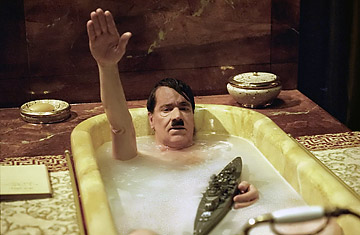
German actor Helge Schneider playing Adolf Hitler in the movie Mein Fuhrer
Even before the film opened in Berlin this week, it had sparked a huge debate in the German commentariat. Critics attacked it for making light of Germany's past. They questioned the idea of humanizing Hitler, even as a pathetic loser, and of treating the Holocaust in a comedy. Rolf Hochhuth, 75, the prominent German dramatist who , coincidentally, is now staging his own play about Hitler, condemned the movie for "tampering with history." Even the film's lead actor, the popular comedian Helge Schneider, admitted he now regrets doing the film. Adjustments in the editing suite focused the film too much on the portrayal of Hitler as a weakling, which he said he finds "profane." Many Germans appear to agree. In one poll conducted before its release, 56% said they disapproved of Germany making a comedy about the dictator, while only 30% said they thought it a good thing to do. "I come from a Holocaust family," Dieter Graumann, vice president of the Central Council of Jews in Germany said in one interview. "It makes me feel queasy if someone is making fun of Hitler and the Holocaust."
The film's director Dani Levy, who is Jewish, said he had fully expected a "tsunami of controversy." But he said he was also tired of seeing Hitler depicted only in grainy documentaries whose visual language, he argued, has become "routine."
"There is a certain kind of laughing that brings knowledge and understanding," Levy said. Not all reviews have been damning. Writing in the weekly magazine Der Spiegel, critic Daniel Haas praised Levy for "dar[ing] the outrageous.... The film is not only about Hitler but about the way in which we are dealing with the brown terror," he said. In fact, after more than a half century of struggling with Hitler's calamitous legacy, Germans do appear to be taking a slightly less tortured view of their past. Downfall, a serious treatment of Hitler's last days, appeared in cinemas in 2004. And this month, the stage play Heil Hitler! , "a grotesque, ironical and humorous attempt to come to terms with history," according to its playwright Rolf Hochhuth, opens in Berlin. Interestingly, the company hired to put up the Heil Hitler! publicity posters in Berlin refused at first; an executive said he found the play's title too "hard to stomach."
I went to see Mein Fuhrer at a downtown cinema the day it opened. I laughed twice during the film, and felt a bit uneasy doing so. And I didn't learn much, for all the hoopla. I suppose I am not outraged that the film was made. But it did feel weird barking out the words mein fuhrer in Berlin, even at a cinema ticket window in 2007.
— With reporting by Stephanie Kirchner
